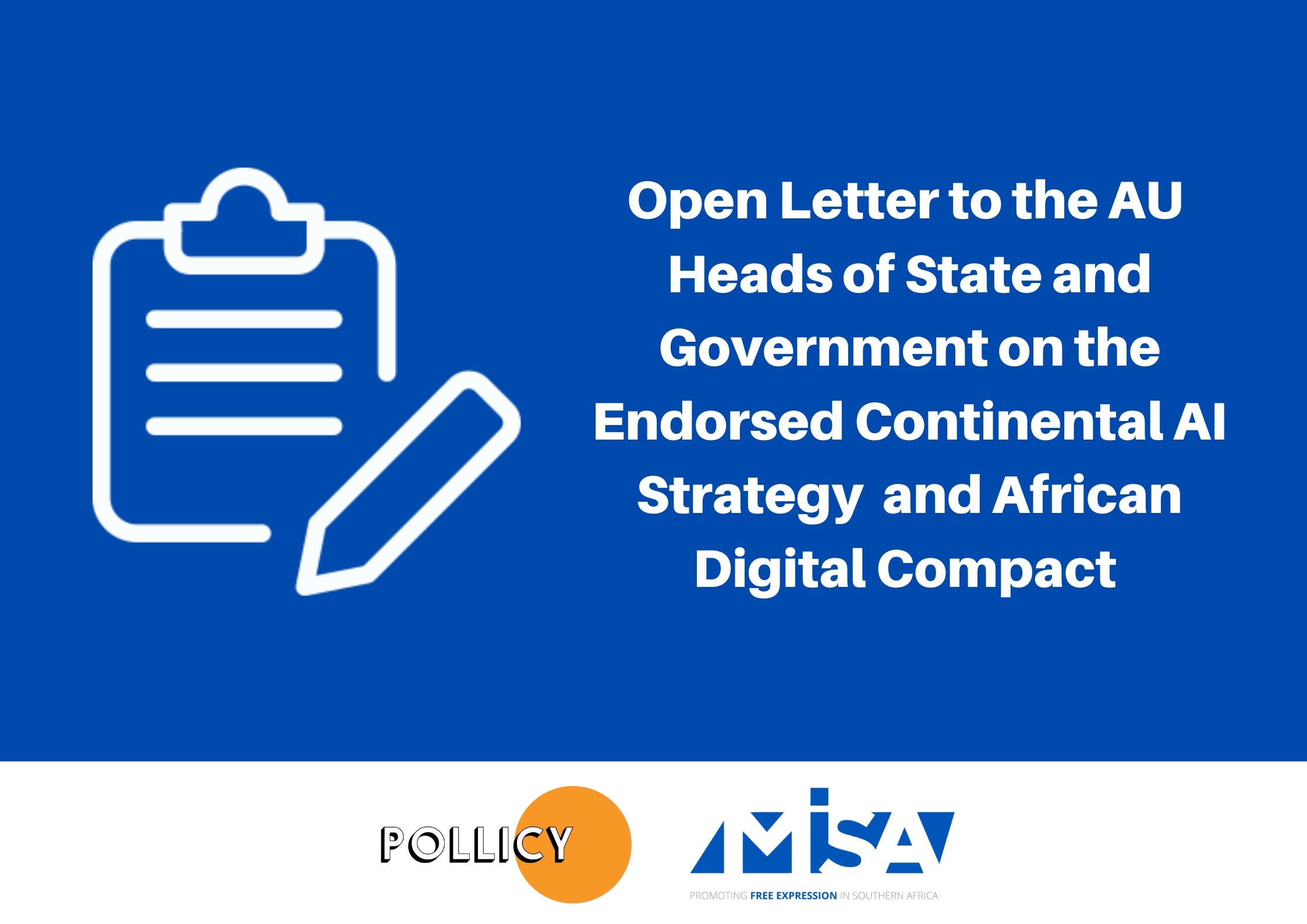Date: 22 July 2024
Your Excellencies,
1. This open letter is produced in response to the statement made on 17 June 2024 by the African Union Commission announcing the endorsement of the Continental Artificial
Intelligence (AI) Strategy and African Digital Compact by African ICT and Communications Ministers.
2. The letter is commissioned by a coalition of civic tech and civil society organizations, convened by Pollicy and the Media Institute of Southern Africa (MISA).
3. Your Excellences, we applaud the African Union and its partners for their visionary leadership and collaborative efforts in developing and endorsing the Continental AI Strategy and African Digital Compact. This strategic initiative reflects a commitment to harnessing technological advancements for the betterment of all African people and sets a precedent for collective action in addressing the continent’s digital future.
4. We note that, while the strategy and digital compact were unanimously endorsed at the 2nd Extraordinary Session of the Specialized Technical Committee on Communication and ICT from 11 – 13 June 2024, their implementation at the national level is currently only a recommendation by the AUC. Therefore, the successful outcomes depend on the member
states’ ability to translate the objectives of the Continental AI Strategy and African Digital Compact into binding national policies.
5. Recognizing the significance of this endorsement in accelerating digital transformation across the continent; Emphasizing that this is only the initial step towards achieving
meaningful outcomes for the people of Africa; Echoing the sentiments of Dr. Amani Abou-Zeid: “Artificial Intelligence presents tremendous opportunities. It is a driving force for
positive transformational change as well as economic growth and social progress”; Acknowledging the associated transformational risks of AI, which, if not addressed with
adequate policy, can have lasting negative impacts on African societies, including AI-enabled propaganda and misinformation; we, therefore, recommend the following actions:
a. We call upon all Heads of State to participate fully at the upcoming AU Assembly to discuss and adopt the Continental AI Strategy and African Digital Compact.
b. We urge the AUC Chairperson, H.E. Moussa Faki Mahamat, to stress the crucial importance of member states implementing the AUC Data Policy Framework. Data is central to achieving the vision of the Digital Compact and should be governed in a manner that protects Africans’ fundamental rights and freedoms.
c. We recommend that the AUC, together with its implementation agency AUDA-NEPAD, establish improved pipelines for partnerships with Civil Society Organizations and various African communities. This collaboration is essential for implementing matters related to emerging technologies under the flagship programs of Agenda 2063, including the Continental AI Strategy and African Digital Compact.
6. Ensuring AI works for Africa will require collective efforts among various African actors, including governments, civil society, and the private sector – therefore we, the undersigned,
extend an open hand to partner with political leadership in this great endeavour.
Produced by:
Kristophina Shilongo, Tech Policy Researcher niitah467@gmail.com
Irene Mwendwa, Executive Director: Pollicy mwendwa@pollicy.org
Dr Tabani Moyo, Regional Director: Media Institute of Southern Africa (MISA) tabani@misa.org
CC:
H.E. Moussa Faki Mahamat, Chairperson – African Union Commission
Dr. Amani Abou-Zeid, African Union Commissioner for Infrastructure and Energy
Ms. Nardos Bekele-Thomas, Chief Executive Officer – AUDA-NEPAD
Dr Msingathi Sipuka, Chief of Staff – AUDA-NEPAD
Mr Symerre Grey-Johnson, Head: Partnerships, Regional Integration, Infrastructure and Trade
Division – AUDA-NEPAD
Specialised Technical Committee on Communication and Information Communications Technology
(STC-CICT)
Signed by:
Mozilla
Women of Uganda Network (WOUGNET)
Tech Global Institute
Baraza Media Lab
Kauna Ibrahim Malgwi, African content moderators union
Uchechukwu Emmanuel Ezekiel, Content Moderator/ ACMU Nigeria
Digital Dada Podcast
Adeboro Odunlami, Coordinator / African Internet Rights Alliance
Ebassa Gwladys, Pollicy / Research fellow
Annex Kemanzi, Pollicy / Program Assistant
Paradigm Initiative
Siasa Place
Angela Chukunzira
Juliet Atellah, Digital Strategist / Siasa Place
Chinasa T. Okolo, Ph.D., Fellow, The Brookings Institution and Consulting Expert, AU-AI Continental
Strategy for Africa
Bridget Chipungu, Executive Director / AI-RAISE
Michael Zimba, Assoc. Prof / Malawi University of Science and Technology
Zeddy Misiga, Data and Learning Lead / ICON Data and Learning Labs
Relance Kataliko, Executive Director / DigiYouth Africa
Women and Youth in Development and Nature Conservation
Melissa Zisengwe
Accountability Lab Nigeria
Silas B. Owiti, Policy Lead / Berdicom
#Defyhatenow Cameroon
Laure Nganlay, Free Communication & Social Media Management Consultant / Yaounde – Cameroon
Emerge Africa
Un Monde Avenir
Equal Namibia
Foka Sherifatu Kinyuy, Advisory board member / Comagend
Martin Mavenjina, Senior Program Advisor-Transitional Justice / Kenya Human Rights Commission
Robotics Society of Kenya
Michael Mbaluto Mutinda, Lawyer
PROTEGE QV
Fantsuam Foundation
Center for Information Technology and Development (CITAD)
Nathan Nkunzi, ACMU
Stephen Muasya, CEO / Global Smart Investment / Aspiring to be a member of AI and Cyber security
Taskforce at AU
CEPHAS JOSEPH, PRIVACY TECHNOLOGIST / PRIVACY INNOVATION LAB
Steven AKOMIAN, Data Protection Expert and AI Researcher / Straterjai
Ziyaad Bhorat, Country Lead (US & South Africa) and Global AI Policy, Mozilla
Mbong Vera, Social Media Coordinator / #DEFYHATENOW









